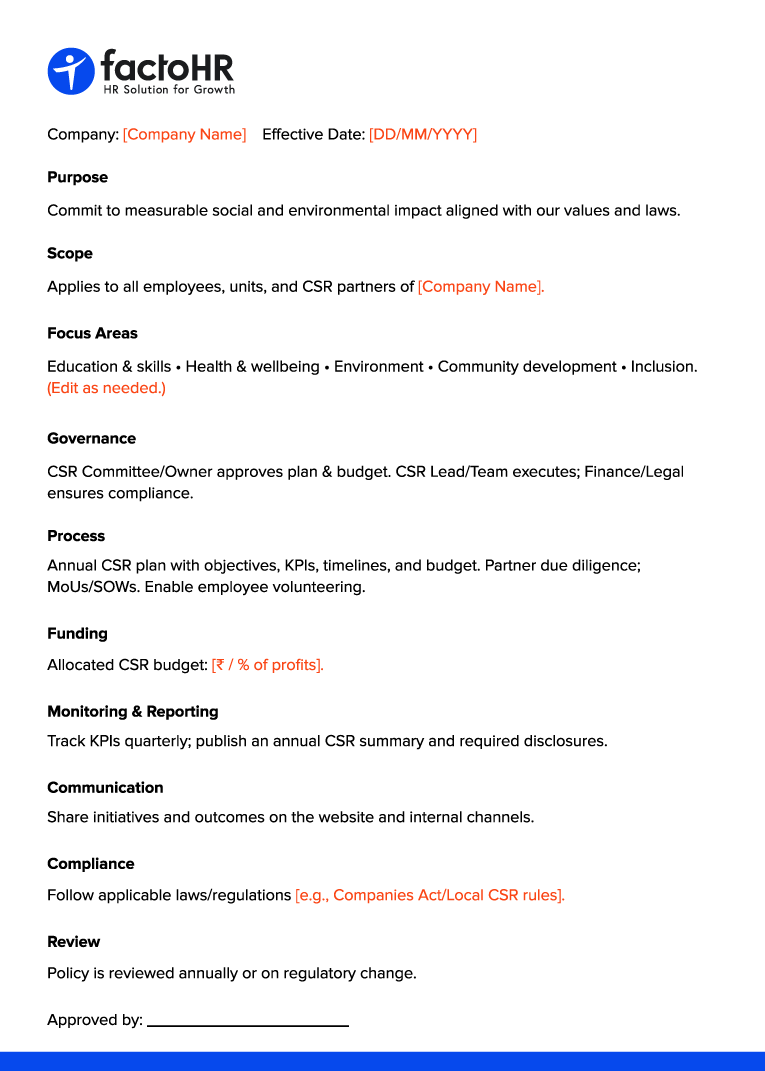Corporate Social Responsibility (CSR) Company Policy Template
Table of Contents
The Corporate Social Responsibility (CSR) is a company’s voluntary commitment to operate in an ethical, sustainable way that creates a positive impact on society and the environment. It integrates social, environmental, and economic issues into business strategies and goes beyond legal compliance to promote overall well-being.

Corporate Social Responsibility Policy Template
Using CSR, companies are committed to:
- Integrate societal values and expectations into company operations
- Support sustainable development by reducing adverse effects and creating positive change
- Improve the company’s reputation and build trust with stakeholders
- Ensure legal and regulatory compliance

Download Free CSR policy for Employee
Policy Brief and Purpose
This policy shows [Company Name]’s commitment to doing business in an honest, responsible, and sustainable way. It provides clear guidelines to ensure that social, environmental, and ethical values are included in its operations and in how we engage with stakeholders.
Scope and Applicability
This policy applies to everyone associated with an organization, including employees, managers, and other partners. It addresses all the aspects of work and how the organization interacts with the community. By following this policy, the company can create an environment where employees take responsibility and show a commitment to ethical conduct.
Corporate Commitments
[Name of the Company] is dedicated to:
- Operate ethically and transparently
- Respecting human rights
- Reducing environmental impact
- Supporting community development
- Promoting diversity, equity, and inclusion
- Maintaining fair labor practices
Core Areas of Responsibility
1. Ethical Business Practices
- Maintaining ethical and fair business conduct
- Complying with anti-corruption laws and avoiding conflicts of interest.
- Promoting honesty across all operations
2. Human Rights
- Protecting and encouraging the human rights of all stakeholders
- Avoiding any involvement in human rights violations and ensuring fair treatment of all employees
3. Sustainable Environmental Practices
- Reducing waste and energy consumption along carbon footprints.
- Adhering to environmental laws
- Encouraging sustainable operations in the supply chain
4. Community Involvement
- Supporting community projects and charitable causes.
- Encouraging employee involvement in community service
- Building partnerships that contribute to community well-being.
5. Workplace Practices
- Ensuring a safe, inclusive, and respectful working environment.
- Providing fair wages and benefits.
- Supporting employees’ career growth and work-life balance.
6. Implementation and Governance
- The policy will be implemented under the guidance of the [CSR Committee/HR Department/Sustainability Office].
- Regular evaluations will be done to measure CSR performance.
- Feedback will be collected from stakeholders to improve CSR initiatives.
7. Emergencies and Natural Calamities
- The organization is committed to providing timely relief, support, and rehabilitation services in case of natural calamities or emergencies.
8. Monitoring and Reporting
- Annual CSR reports will be published to communicate progress and future goals.
- Internal audits will ensure compliance with this policy and related standards.
9. Review and Updates
The Corporate Social Responsibility policy will be reviewed annually. It will be updated as required, based on stakeholder feedback, changing societal expectations, and emerging best practices. All changes will be subject to approval by the [e.g., Board of Directors].
10. Contact Information
For any questions or concerns about CSR policy, please contact [Contact Information]. This policy is subject to change at the discretion of the company and is meant to guide CSR activities. It may be updated to meet specific circumstances and changing requirements.
Approved by: [Executive Name / Board of Directors]
Effective Date: [Date]
Next Review Date: [Date]

What are the Companies (Corporate Social Responsibility Policy) Amendment Rules, 2025
The Corporate Social Responsibility Policy Amendment Rules, 2025, introduce stricter rules for corporate CSR spending to improve transparency, accountability, and tracking. It introduces stricter registration, reporting, and documentation requirements for both companies and implementing agencies, like NGOs.
New CSR-1 Form
The previous CSR-1 form is replaced by a web-based e-form. Companies must use this to register CSR projects and the NGOs/Section 8 companies/trusts/societies with which they wish to collaborate. The new form requires more supporting documents and proof.
Registration of Implementing Agencies
NGOs and other entities must register through the new CSR-1 process, with documents required including registration certificates, PAN, audited accounts (3 years), board resolution, and FCRA approval (if applicable). Only registered bodies can receive CSR funds.
CSR Reporting (Form CSR-2)
Companies must file CSR reports using CSR-2 within prescribed timelines. Transitional dates apply for FY 2023–24. Missing deadlines may result in penalties.
Schedule VII Activities
CSR funds can only be used in approved areas like health, education, sanitation, environment, livelihoods, etc. All projects should fall under one of these categories.
Due Diligence
Companies conduct thorough checks on NGOs before engaging with them, looking at governance, financials, past projects, and beneficiary verification systems.
Onboarding Agencies
Companies should not engage any NGO/trust unless it appears on the CSR-1 registry. Keep complete documentation and agreements on file.
CSR Committee Monitoring
Boards/CSR Committees must record approvals, monitor plans, and ensure that projects align with Schedule VII. Even if a formal committee is not required (CSR spend below ₹50 lakh), the board must record decisions in minutes.
Audit Trail
Manage contracts, reports, receipts, payments, and third-party verifications to ensure the proper use of CSR funds. This is crucial due to rising scrutiny and enforcement actions.
Read More About Other HR Policy

Final Thoughts
This policy shows a commitment to conducting business responsibly and ethically, along with prioritizing community welfare and environmental protection. It guides the integration of sustainability, accountability, and fairness into all business activities.
The policy helps create a positive difference by always trying to get better, building strong connections, and making choices that create lasting value. Collaboration creates trust, resilience, and helps grow in a sustainable way.
What is the CSR Policy in India?
The CSR policy in India, under Section 135 of the Companies Act 2013, mandates eligible companies to spend at least 2% of their average net profits from the last three years on CSR activities. These activities focus on social, environmental, and economic development to promote the welfare of society.
What is CSR Applicability in India?
Corporate Social Responsibility (CSR) applies to all companies, including their holding or subsidiary entities and foreign companies with a branch or project office in India, if they meet any of the following criteria in the preceding financial year:
- Net worth of ₹500 crore or more, or
- Turnover of ₹1,000 crore or more, or
- Net profit of ₹5 crore or more
What does Corporate Social Responsibility Mean?
Corporate Social Responsibility (CSR) means a company’s commitment to ethical operations that benefit society and the environment. It goes beyond profit by promoting fair labor practices, reducing environmental impact, supporting local communities, and building sustainable supply chains.
What is an Example of a Corporate Social Responsibility Policy?
A corporate social responsibility policy is a formal statement of a company’s ethical, social, and environmental commitments, ensuring legal compliance. For example, our company is committed to operating responsibly and sustainably by reducing carbon footprint, supporting education and healthcare, ensuring fair labor practices, and fostering diversity and inclusion.
What to Include in CSR Policy?
A CSR policy should include the company’s commitment to ethical practices, environmental sustainability, human rights, and community development. It must outline CSR objectives and focus areas under Schedule VII of the Companies Act, 2013, along with the implementation plan, monitoring process, and CSR Committee roles.
Why is a Corporate Social Responsibility Policy Important?
A Corporate Social Responsibility policy is important as it reflects a company’s commitment to ethical practices, environmental stewardship, and community welfare, helping to build trust and positive relationships with stakeholders.
What are the Benefits of Having a CSR Policy for Organizations?
The benefits of having a CSR policy include creating a positive social and environmental impact, boosting employee satisfaction and retention by feeling proud of being part of a socially responsible organization, and attracting customers who value businesses committed to making a difference beyond their core operations.
Which Activities do Not Qualify as an Eligible CSR Activity?
Rule 2(1)(d) of the Companies (CSR Policy) Rules, 2014 defines CSR and excludes the following from being considered eligible CSR activities:
- Routine business activities of the company
- Activities outside India (except certain sports training)
- Those primarily benefit the company’s employees
- Political contributions or donations
- Expenses related to business promotion or marketing
- Activities outside the CSR areas prescribed by law
Disclaimer
This template is meant to provide general guidelines and should be used for reference purposes only. It may not take into account all relevant central, state, or local laws and is not intended to be a legal document. factoHR assumes no legal liability that may arise from the use of this template.
Transform your HR operations with factoHR today
Choose a perfect plan satisfying your business demands and let factoHR handle all your HR’s tasks efficiently.

© 2026 Copyright factoHR


